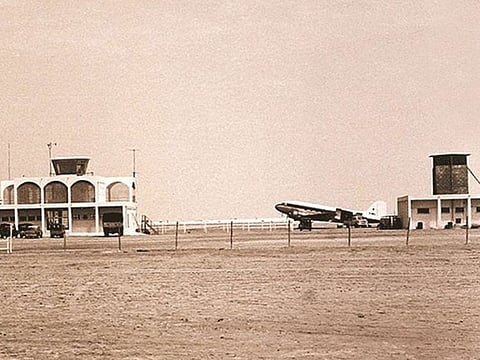Watch: Dubai International Airport’s humble beginning in the 1960s
Dubai Media Office released footage of how one of the world’s busiest airports started

Also In This Package
Dubai: The transformation of Dubai International Airport has been impressive, to say the least, since it started out in 1959.
The journey from a vast wasteland to a massive hub that covers an impressive area of 3,100 acres has been carefully documented over the years – and the footage is a remarkable one.
Dubai Media Office has released a black and white video of the emirate’s modest airport during the 1960s, offering viewers a glimpse into Dubai’s past.
The video, which was posted on the media office’s social networking sites, was accompanied with the caption: “A modest beginning paved the way for taking on the world @DXB”.
By 1960, the airport of Dubai was opened and capable of handling aircrafts as large as a DC-3.
Authorities started construction of the airport in 1959, which at that time, was situated about four kilometres from the edge of the city.
Work to build an asphalt runway began in 1963, and was opened in 1965 along with a number of other newly-built or refurbished facilities.
In 1969, Dubai International was able to cater to nine airlines that reached a total of 20 destinations.
The 1970s witnessed many developments across the airport, starting with a new three-storey terminal building, a new control tower, additional taxiways, lengthening of the runway, extension of aprons, airfield lighting and landing instruments.
The second runway was soon installed in 1984, equipped with the latest meteorological, airfield lighting and instrument landing systems to give the airport a Category II classification.
Terminal 2 was opened in 1998, and played an important role in increasing the airport’s capacity by two million passengers per year.
In 2000, Dubai International saw the launch of Shaikh Rashid Terminal – known as Terminal 1- and was built as part of the first phase of the general expansion project at a cost of Dh2 billion. The terminal increased the airport’s capacity from 10 million to 23 million.
Earlier this year, the airport once again claimed the title of “world’s busiest airport for international travel”, with nearly 90 million passengers in 2018, surpassing London and Hong Kong International Airports, which recorded 75 million and 74 million respectively.
Sign up for the Daily Briefing
Get the latest news and updates straight to your inbox




